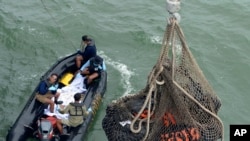Indonesian search and recovery teams resumed their hunt Sunday for the wreck of an AirAsia passenger jet after locating five "large objects" in the Java Sea.
However, the search continues to be hampered by bad weather. Divers were forced to turn back Sunday after nearing the suspected wreckage site.
Bambang Soelistyo, the head of Indonesia's National Search and Rescue Agency, said Sunday, "They made the dive but in the sea-bed the visibility was zero which means complete darkness, with muddy sea-bed."
Authorities are looking for a possible break in the weather sometime during the day. The recovery effort has been severely slowed in recent days by heavy rain and wind causing high waves and strong currents.
Recovery teams hope to reach what they believe is the plane’s fuselage to retrieve bodies and the aircraft's flight data recorders - the "black boxes" - located in the tail section of the aircraft.
Indonesian officials say 31 bodies have so been retrieved after another was recovered Sunday. The Airbus A320 was carrying 162 passengers and crew when it disappeared from radar last Sunday.
The search was widened Saturday as authorities say debris may have drifted as far away as the coastline of southern Borneo.
Weather a factor in crash
In a new report, Indonesia's weather bureau said weather conditions were a factor in causing the plane to plunge into the Java Sea. The report said the aircraft had flown into bad weather that would have been difficult to avoid.
Flight QZ8501 crashed into the Java Sea about 40 minutes after taking off from Indonesia's second-largest city, Surabaya, en route to Singapore. The twin-engine jet disappeared from radar without a distress call nearly halfway into the flight. There were no survivors.
Until investigators can examine the flight recorders, the cause of the crash remains unknown, but the area is known for intense seasonal storms and Indonesia's meteorological bureau has said bad weather was likely a factor.
A source close to the investigation told the Reuters news agency that radar data appeared to show the aircraft made an "unbelievably" steep climb before it crashed, possibly pushing it beyond the A320's limits.
The Indonesian captain, a former air force fighter pilot, had logged 6,100 flying hours on the A320, and the plane last underwent maintenance in mid-November, according to Indonesia AirAsia, 49 percent owned by Malaysia-based AirAsia.
Searchers have been trying to get images of what may be the plane's wreckage using remotely operated underwater vehicles.
Officials said the search for the flight data recorders, which send out a soft pinging sound, may be hampered by the number of search vessels in the area.
Toos Sanitiyoso, air safety investigation official with the National Committee for Transport Safety, noted that the water in the search area is not very deep — "30, up to 40 meters. Theoretically, we should avoid high level of noise in order to find the detail signal, because the signal is not a very big signal. It's quite weak signal from the pinger.''
Indonesian officials say bodies are being transported to Surabaya for identification. Images from inside a C-130 transport plane showed white, numbered caskets in line next to one another, a bouquet of flowers on top of each.
Portions of the plane, including an exit door, inflatable escape ramp, suitcases and other debris have also been recovered.
Among the bodies already returned to families is that of an AirAsia flight attendant and a young Indonesian man studying at an Australian university. Most of the 162 people on board the Airbus jet came from Indonesia and were traveling to Singapore to mark New Year celebrations.
Many bodies are expected to be found in the main fuselage of the plane, with some authorities speculating the plane's experienced pilot may have landed it on the water before it sank.
U.N. Secretary-General Ban Ki-moon joined regional leaders in expressing condolences and thanking international teams in the search. Up to 29 vessels, 17 aircraft and sonar equipment are being used to help locate wreckage of the jet. Russia has joined the search alongside Singapore, the United States, Malaysia and Australia, and China.
Permit for route canceled
Indonesia’s director general of air transport, Djoko Murjatmodjo, said Saturday that AirAsia’s permit to continue flying the Surabaya-to-Singapore route had been canceled after finding the plane was not allowed to fly the scheduled service.
AirAsia Indonesia’s chief executive, Sunu Widatmoko, told a news conference Saturday that the company would abide by the investigation’s outcome.
“As you all know, the government has suspended our flight QZ8501 from Surabaya to Singapore, and to that effect the government is now doing the re-evaluation process to investigate," Widatmoko said. "And in that regard, AirAsia management would fully cooperate with the government in that evaluation process.”
Widatmoko said AirAsia would be making no further comment until the investigation was completed.
Aviation analyst Hugh Ritchie, chief executive of Sydney-based Aviation Consultants International, said that while the issue might be technical, the investigation could lead to litigation.
“That’s going to cause them a lot of trouble, because they’re not licensed to (travel the route), therefore they are not going to have insurance," he said. "They’re probably going to be included in any litigious exposure.”
The accident was the first by AirAsia since the parent company was launched in Malaysia in 2002. The Indonesian offshoot first began service in 2006. AirAsia, including subsidiaries in the Philippines and Thailand, is led by chief executive officer Tony Fernandes.
Ron Corbin contributed to this report from Bangkok. Some information came from Reuters.





